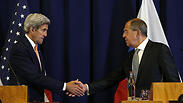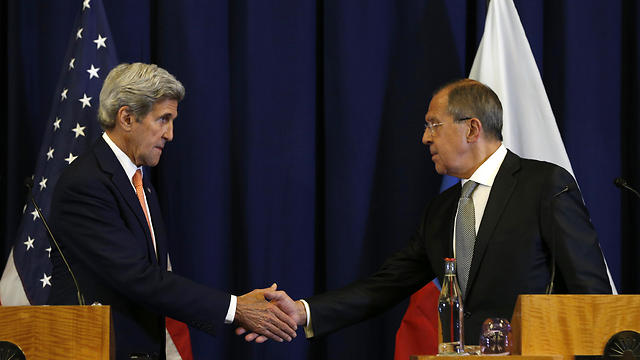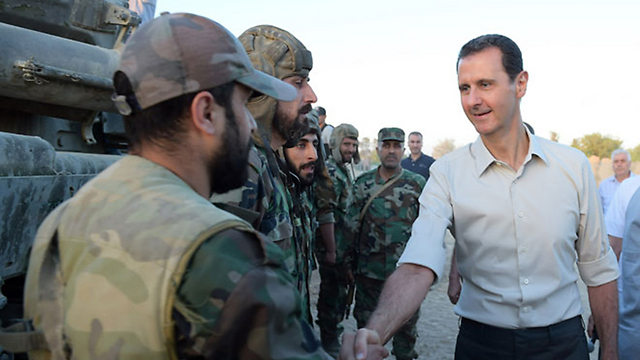
L to R: John Kerry and Sergey Lavrov
צילום: AP
Russia-US-brokered Syria ceasefire to start at sunset
The cessation of hostilities to begin Monday, with the verbal backing of President Assad's government and amid mixed messages of commitment from Syria's various rebel factions.
In a stark message to opponents, Assad made a rare public appearance Monday by attending prayers for the Muslim holiday of Eid al-Adha at a mosque in the Damascus suburb of Daraya. Rebel factions, for their part, have expressed deep reservations about the deal.
The suburb, previously held by the rebels, surrendered last month and reverted to Damascus' control after four years of government siege.
The ceasefire deal, hammered out between US Secretary of State John Kerry and Russian Foreign Minister Sergey Lavrov in Geneva on Saturday, allows the Syrian government to continue to strike at ISIS and al-Qaida-linked militants with the Jabhat Fatah al-Sham group (formerly the Nusra Front), until the US and Russia take over the task in one week's time.
Under the terms of the agreement, the rebels and the Syrian government are expected to stop attacking one another. Along with Assad's government, his key allies—Russia, Iran and the Lebanese militant group Hezbollah—have also endorsed the deal.
But that scenario is complicated by the fact that Jabhat Fatah al-Sham remains intertwined with several other groups fighting on the ground.
One of the more immediate goals of the Kerry-Lavrov agreement is to allow the UN to establish aid corridors into Aleppo, the contested northern Syrian city. Over 2,000 people have been killed in fighting over the past 40 days in the city, including 700 civilians and 160 children, according to a Syrian human rights group.
On Saturday, presumed Russian or government airstrikes on rebel-held Idlib and Aleppo provinces killed over 90 civilians, including 13 children in an attack on a marketplace in Idlib, according to the Britain-based Syrian Observatory for Human Rights.
In the aftermath, rebels and opposition activists were asking on Sunday whether the government's side could be trusted.
Several previously negotiated ceasefires had all collapsed. A partial "cessation of hostilities" that brought sorely needed relief to civilians in March unraveled as the government continued to strike targets in opposition areas, including near a hospital and school near Damascus and a marketplace in Idlib province, killing dozens of civilians.
Previous ceasefires were also preceded by soaring violence as parties on all sides sought to improve their positions in the build-up.
In Turkey, meanwhile, President Recep Tayyip Erdoğan reiterated his earlier calls for establishing a no-fly zone in northern Syria, saying it is essential to boosting security in the area.
Erdoğan said he told the leaders of Germany, France, Russia and the US that training and equipping troops on the ground to battle back ISIS forces is "not enough" and that a no-fly zone should be the next step.
Speaking after holiday prayers on Monday, Erdoğan said Turkey remains resolute in eliminating the threat posed by ISIS at its borders and has made that clear to world leaders.
Turkey launched an incursion into northern Syria in late August, driving ISIS away from the border and also seeking to counter the advance of US-backed Kurdish forces, which Ankara views with suspicion.












